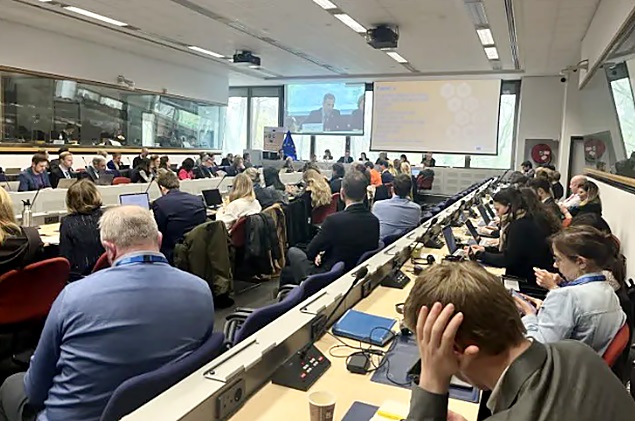1754

As stated in a communication issued by EuroCommerce, the European retailers' program 'Retail Transition Pathway' has been launched as an action plan built on what has been learned in recent years and co-created, bringing together many different actors involved in the ecosystem. Here's what European retailers aspire to:
"The program identifies what is needed for retailers and wholesalers to achieve sustainability, digitalization, and skills transformation and to be more competitive and resilient.
The launch conference provided the opportunity to highlight what businesses are already doing and to confirm that it is about working together at the European, national, regional, and local levels and with all stakeholders involved, whether they are companies, associations, supply chain partners, farmers, unions, education providers, or cities and towns.
The conference was also an opportunity to help the retail ecosystem recognize its contribution and create momentum so that the actions identified for retail and wholesale can be acted upon in the next mandate.
Why is this important?
The Commission has recognized that for the EU, retail is the largest industrial ecosystem. Retail and wholesale are the largest private employers in the EU, employing 26 million or 1 in 7 jobs, contributing to 10% of the EU's GDP and supporting millions of jobs in supply chains, from small suppliers to large international companies. During the pandemic, the sector ensured that consumers could continue to find and buy their daily groceries.
Our sector supports entrepreneurship, with over 99% of the 5 million retail and wholesale companies being SMEs (1 in 4 of all SMEs in the EU). The sector plays a key role in local communities and in the life and attractiveness of cities, smaller towns, and villages.
For retail and wholesale to remain competitive and better serve the millions of business customers and consumers in the EU, we need the capacity to invest and grow our businesses.
This will help the EU achieve its climate, digitalization, and skills objectives. In 2022, in a study with McKinsey, we identified that the retail and wholesale sector needs to invest up to 600 billion EUR for transformation into sustainability and digitalization and for the talent that supports it. We see the transition pathway as a tool that will ensure that national and EU decision-makers support and prioritize the transformation of our sector.
This is why we have prepared a detailed contribution to both the retail and agri-food ecosystems, building on work already undertaken, analyzing the five key projects the sector needs for transformation, to ensure that the plans align with what retailers and wholesalers potentially need.
What do we want for the future?
What we want to see is that the transition pathway results in propelling the single market. A well-functioning and more competitive retail ecosystem, especially when coupled with a manageable regulatory environment, is what supports the future vision contained in the transition pathway and its future success.
This requires regulation that is workable and avoids disruptions, such as strict payment terms that will hinder the ability to finance operations or afford investments and truly addresses the barriers we regularly document.
There needs to be a strong foundation for transformation supported by infrastructure, access to recycled raw materials, technological advancements, consumer awareness, matching real estate to needs, a well-prepared and skilled future workforce, and an understanding of how the value chain operates.
There also needs to be actions to overcome investment barriers, to ensure that retailers and wholesalers benefit from financial support, investment incentives, increased utilization of financing for research and innovation, or the development of public-private partnerships and actions to address skills gaps.
This requires working together. By sharing best practices to learn what retailers and wholesalers are already doing and achieving, including progress in decarbonization, packaging, waste reduction, recycling, and communicating with consumers to encourage initiatives in harmony with what is already happening.
It needs steps to help raise the profile of career opportunities in the sector. Also, starting from the importance of collaboration, whether to facilitate sustainability transformation or more day-to-day operations, for example, agreeing on mutually beneficial payment terms and supporting workers.
The desire to work together for a common future
The size and contribution of retail and wholesale mean it has the potential to contribute to the EU's climate, societal, digitalization, and skills objectives. In other words, what retail and wholesale do has a positive impact for the EU due to our daily contact with consumers and businesses.
Our position in the value chain means we can support and drive change, for example, by suppliers, through capacity building.
Our hope is that as the Commission begins to prepare mission letters for future commissioners, the Single Market and transition pathways are placed at the center of attention. That the Commission recognizes that currently, retail and wholesale are strong partners for resilience, digitalization, and sustainability.
That the momentum started by the conference is maintained. The transition pathway is just a first step that needs to gain momentum in the next mandate - so that existing ideas can be accelerated and further developed with renewed enthusiasm. We look forward to participating(Photo: Eurocommerce)





